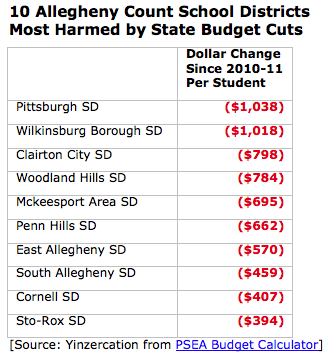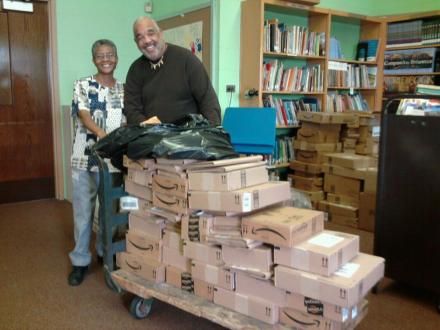The end of the school year is almost here and all we want to think about is sunshine and happy things. Fortunately, there is much good news to report! So in the spirit of summer vacation and all things wonderful, here is our top six list of public education goodness:
Good Stuff #1: Election Results!
I am still on a high from the primary election last week. As our very own Kathy Newman wrote on Diane Ravitch’s national blog, Pittsburgh voters:
“delivered a resounding message that they support the broad platform of education justice for the Pittsburgh Public schools. This platform includes: Community Schools—schools which provide wrap-around, nutrition and psychological services to needy children during the school day and beyond, restorative justice rather than discipline and punish, more resources for nurses, librarians and counselors, a push back against over-testing, and a district budget that is determined by what students need to succeed rather than austerity, closing schools, and right-sizing. … Each of the four school board candidates who ran on this platform won the Democratic primary nomination, and they are all but assured to win in the fall, and to begin serving on the school board in late 2015.”
The winning candidates are the District 2 incumbent, Regina Holley, a former Pittsburgh principal and strong advocate for our students and schools. I have great respect for Dr. Holley and it has been an honor working with and getting to know her these past few years. In the hotly contested District 4 race, Lynda Wrenn won in a landslide victory, demonstrating the power of grassroots coalition building, with parents, teachers, and community members providing an army of “boots on the ground” to get out the word. Ms. Wrenn is the mother of two PPS graduates and two current students, has served as a PTO president, worked with the district on numerous task forces, has a master’s in teaching from Chatham, and is deeply involved in the community.
In District 6 the city gains a new champion for education justice with Moira Kaleida, a community leader who is active with Great Public Schools (GPS) Pittsburgh and mother of two young children just starting in the public schools. District 8 also endorsed a candidate running on a strong equity platform: Kevin Carter, the founder and CEO of the Adonai Center for Black Males, a nonprofit that helps young men transition from high school to college or trade school, and from higher education to the workplace. In debates this spring and in public statements and personal conversations, I’ve been very impressed with both Ms. Kaleida’s and Mr. Carter’s understanding of the issues facing public education.
These four candidates will join four other school board members elected in 2013 who were also backed by the education justice movement. That makes Pittsburgh’s board a rarity among large U.S. cities: democratically elected and supportive of evidence-backed policies to make all our schools the places all of our children deserve.
A final note about the elections: congratulations to our colleague Helen Gym, who won a huge primary victory for Philadelphia City Council running on a public education platform! This is absolutely amazing news for Philly and for all of us in Pennsylvania.
Good Stuff #2: Testing Resistance!
Mary King made big waves here and nationally when she refused to give high-stakes-tests to her students this spring. [Post-Gazette, 5-23-15] Ms. King teaches English language learners at Pittsburgh Colfax and decided that she had to take a stand as a conscientious objector after witnessing the harm done to her students. [See our “Brave Teachers Speak Out About Testing”] The Post-Gazette article about her was the #1 most shared story in last Saturday’s paper, and was also hilariously featured in Gary Rotstein’s Morning File on Monday. [Post-Gazette, 5-25-15] Diane Ravitch even named Mary King to her national honor roll!
As Pittsburgh teacher Kipp Dawson points out in a letter to the editor today, Mary King is in good company (despite the paper’s characterization of her taking a “lone stand”):
“Indeed, Mary King’s action in refusing to administer the state tests to her ESL students is unique, courageous and pioneering. However, far from standing alone, she is part of a growing movement of parents, teachers and students who are standing up against the egregious testing mania which is part of the current attacks on public schools. As a middle-school teacher in the Pittsburgh Public Schools, it is my experience that it would be hard to find a teacher who does not have similar stories about how the testing frenzy has hurt individual students, let alone how it has been a central part of the destruction of real teaching and learning in our schools.
“Just last week Jim Scanlon, superintendent of the West Chester Area School District, sent a letter to parents in which he says, among other things, “… we are asking our students to do something that’s entirely unfair: To spend weeks and weeks filling in bubbles, taking standardized tests and having their entire educational ambition directed toward passing them. This is not what public education was intended to do, nor should do. … I believe in very high standards for our students. I believe in accountability. I do believe that tests can be a good thing. But not the way we are being forced, by the government, to give them.”
“Many of us would welcome such leadership from Pittsburgh Public Schools, but we are not waiting for it. Saluting Mary King, and working alongside her, many of us teachers, parents and students keep working to help people stand up against the testing mania, along with all of the other undermining that the “reformers” are attempting to do to our public schools.” [Post-Gazette, 5-29-15]
Indeed, the movement against the overuse and misuse of high-stakes-testing is growing exponentially here in Southwest Pennsylvania. As one simple measure of interest in this issue, my piece last month on “The Religious Reasons My Kids Won’t Be Taking the Test” has become our second most read post of all time; was shared by readers from this blog over 2,000 times; reached over 26,000 people from our Facebook page; and was re-published by the Washington Post and AlterNet.org.
Good Stuff #3: Listen to Teachers!
If Mary King’s courageous stand against high-stakes-testing tells us anything it’s that we should be listening to teachers. Scholastic recently surveyed all of the State Teacher of the Year winners. These top educators have been recognized by each state as the very best in the nation, and not surprisingly, they tend to agree on how we should be approaching education reform: the report noted, “Teachers see issues like poverty, family stress and other out-of-school barriers to learning greatly affecting student academic success, and they prioritize things like anti-poverty initiatives, early learning and other community supports and services for funding.”
Not a mention in here of testing students more, or more “rigor,” or “standards,” or “firing bad teachers.” Nope. Listen to their recommendations about what actually works for students: “If these teachers could choose where to focus education funding in order to have the highest impact on student learning, their top priorities would be: Anti-poverty initiatives, early learning, reducing barriers to learning (access to wrap-around services, healthcare, etc.), and professional development/learning.” [Scholastic 2015 Survey] Sounds like our education justice platform, no?
Good Stuff #4: Governor Wolf!
Oh, this Governor. He wants to put more money into the public education budget! He’s going around the state lobbying for early childhood education rather than more prisons. [Post-Gazette, 5-26-15] He even sent a sharply worded letter to the Pennsylvania Chamber of Business and Industry, which opposes restoring the budget cuts to public schools, accusing business leaders of putting “oil and gas special interests” before the interests of our children. [Post-Gazette, 5-19-15] What is he thinking? Happily, he is doing exactly what we asked him to do when we elected him with a clear mandate to support public education. We still have plenty of work to do with legislators who do not think schools and kids should come first. But what a refreshing change of leadership from the very top. And we did this!
Good Stuff #5: Lobbying to End School Push-Out!
On Tuesday, our coalition Great Public Schools Pittsburgh held a rally before the school board meeting to highlight school push-out. Students of color and students with special education needs are disproportionately impacted by school suspensions and other practices that push kids out of school and, too often, into the prison pipeline. For example, last year African-American students, who comprise 54% of the Pittsburgh student body, received over three-quarters (77%) of the district’s suspensions.
Our very own Pam Harbin has been leading a GPS working group aimed at developing recommendations to address this inequity that has life-long consequences for affected students. This week, we called on the district to commit to the following:
- Adopt support-based, district-wide disciplinary policies that move away from exclusionary discipline practices in favor of a comprehensive restorative justice approach.
- Revise the Student Code of Conduct to divide the levels of infractions for misbehavior into five (5) levels. Out-of-school suspensions are not an option for the first two levels and expulsion is only an option for the fifth level. Remove option of permanent expulsion.
- Further revise the Student Code of Conduct to include a glossary/index that defines every misconduct offense, guidance approach and possible disciplinary responses in student/caregiver friendly language. The Student Code of Conduct must be translated for non-English speaking families.
- Place a moratorium on out-of-school suspensions/expulsions for our youngest students, preK5th grade, with nonviolent misconduct.
- Assign, in every school, at least one fulltime counselor or social worker whose primary job is to coordinate appropriate interventions and support for students.
- Provide PPS police officers and security with the proper and necessary training on topics to meet the varying needs of officers working with youth.
- Publicly report suspension and expulsion data at monthly School Board Legislative meetings broken down by grade, race, and disability category.
The effort received considerable press coverage from WESA, KDKA Radio and KDKA TV, KQV, WTAE TV, WPXI TV, the Post-Gazette, and the Courier. That’s pretty incredible! Here are some photos from the event:
Good Stuff #6: More Equity Work!
I am delighted to announce that starting Monday, I have a new job. I will be the inaugural Director of the new Women’s Institute at Chatham University. I also have a faculty appointment and will continue teaching. I will be leading efforts to focus on gender equity through education, research, and outreach – both on campus and in the larger community. I am thrilled that Chatham is continuing its commitment to gender equity and women’s leadership and am excited to be a part of this crucial work. I don’t know how much time I will have for blogging as I settle into the new position, but will certainly remain engaged in our education justice movement. As feminism has taught us, systems of power and oppression overlap; our fight for justice and equity in public education is intimately connected to the fight against racism, poverty, homophobia, sexism, and gender discrimination. I can’t wait to get to work!












